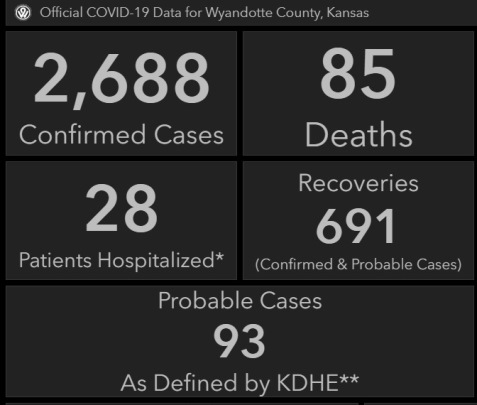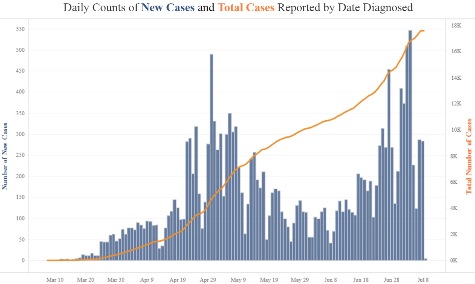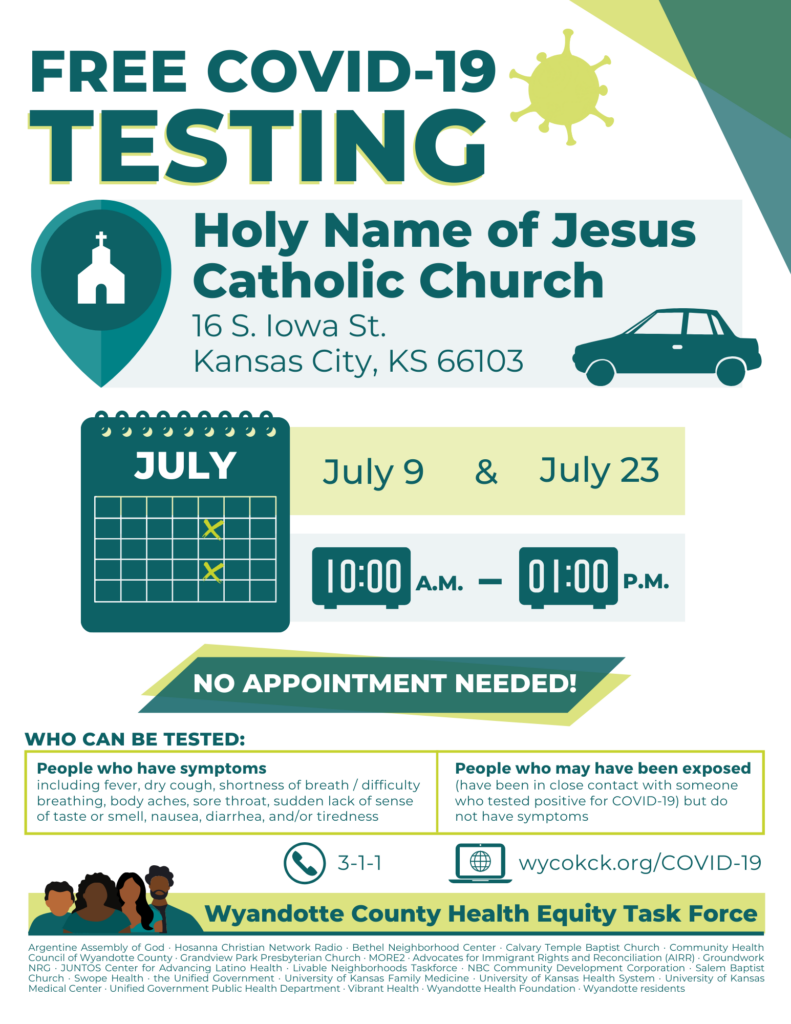

As the nation passed the 3 million mark for positive COVID-19 cases on Wednesday, the top health official in Kansas said the trend of increasing cases here can be reversed.
Kansas positive COVID-19 cases went up by 717 since Monday, for a total of 17,618, Dr. Lee Norman, Kansas secretary of health, said. There were two more deaths in the state since Monday, for a total of 282.
“We are seeing a significant increase in cases,” Dr. Norman said.
As society returns to normal, some people have started gathering and have not always followed health guidelines, according to Dr. Norman. The increased numbers can be reversed, he believes.
It is now, more than ever, essential to take precautions, he said. It’s not necessary to go back a step in the reopening plan if people can continue the basics of social distancing, wearing a mask in public, hand washing and staying at home when sick, he said.
He added there have been some cases traced to people who went to work when they were sick with a low-grade fever.
“It really amazed me that people are still going to work sick when they shouldn’t,” Dr. Norman said. And people should avoid gatherings, he added.
Gatherings are often where the coronavirus is spread, he said. He added he understands the need for businesses to be kept open, but measures such as wearing masks, social distancing can be implemented. He said he advises youth not to hang around others without distancing and having masks.
Dr. Norman said in a 4 p.m. news conference that the number of clusters or outbreaks caused by gatherings had increased by seven in Kansas since Monday. They included gatherings, parties, family get-togethers and church services, he said. There were a total of 23 active clusters caused by gatherings, he said.
In all there were 15 more outbreaks across all categories since Monday. The state had a total of 250 clusters, including 120 active ones, that accounted for 6,726 cases and 211 deaths, he said.
He said the state has been successful in stopping corrections outbreaks by testing as quickly as possible, isolating and quarantining cases, contact tracing and more testing for the staff and residents. Testing and quarantining has been repeated until there is only a very small number left. The numbers included in the positive cases count only one test per person.
Dr. Norman said testing in Kansas has increased threefold since April, when they conducted 26,000 tests.
He added he had heard there were longer waiting times now for test results from commercial labs, and said the state lab’s turnaround time is about 24 hours.
Many counties have opted out of the governor’s mandatory mask order, but studies are showing that mask-wearing and social distancing are stopping the virus in other countries. It will probably take as many as 28 days to see a change in case numbers from mask-wearing.
Dr. Norman cited some scientific studies that supported measures to contain the spread of the virus. One was published July 8 in the publication, “Nature.” The study of the effectiveness of anticontagion policies in many countries showed the COVID-19 infections grow roughly 38 percent per day when they are unabated, he said.
The COVID-19 curve started slowly and now it is growing exponentially, he said.
Anticontagion policies significantly slowed this growth, delaying 62 million cases across six countries, he said.
Another recent article in the journal “Health Affairs” concluded that state mandates in the United States showed a drop between 1 and 2 percent every day, he said. That is a significant drop after 30 days, he said. It also showed a ninefold decrease in COVID-19 per capita mortality rates.
“Masks work,” Dr. Norman said.
COVID-19 patient numbers down slightly at KU Health System
The University of Kansas Health System on Wednesday morning had 19 COVID-19 patients, down from 22 on Tuesday, according to Dr. Dana Hawkinson, medical director of infection prevention and control at the KU Health System.
There were nine patients in the intensive care unit and three on ventilators, according to Dr. Hawkinson, with one more ICU patient and one more ventilator patient since Tuesday. They have had some discharges and some admissions.
It’s not likely that elective surgeries will be shut down again at the hospital if there is a second wave of COVID-19 cases, according to Dr. Sean Kumer, vice president of perioperative and procedural services and a transplant surgeon at KU Health System. KU Health System went from about 300 surgeries and procedures a day to about 75 during that period, but is now back to doing procedures again.
The hospital now has enough personal protective equipment, tests and medications, and has implemented safety measures, he said. They are currently working through a backlog of procedures that had been delayed earlier. The hospital is safer than it was prior to COVID-19, with all the safety procedures, and is now better prepared to handle a surge of patients than it was in March, he said. He said he would hope the hospital has input into any action that may be considered to shut down elective surgeries.
He urged people to maintain their regularly scheduled procedures, and said it was safe to continue with them.
Dr. Kumer said they are currently working around a handful of physicians who are on quarantine, mostly for exposure to someone else. According to the doctors, this commonly happens when a young family member is exposed to someone else who has COVID-19.
There have been no documented cases of patients contracting the disease while in the hospital, according to Dr. Steve Stites, chief medical officer of KU Health System.
He added that there is enough capacity at KU Health System to handle an increase, with the number of hospital beds, ICU bed, personal protective gear and medications.
While people in their 20s may feel they will never get COVID-19, if that person makes family members in their 40s or 60s ill, then reality will set in, he said. He urged people to stay safe.
According to Dr. Hawkinson, doctors at the hospital have been fine-tuning their treatments for COVID-19 patients, and have learned a lot since the beginning of the pandemic. Currently, the age of most patients is younger, and they don’t stay in the hospital as long, typically. More of them are recovering, currently.
Wyandotte County cases increase by 53
COVID-19 case numbers in Wyandotte County rose by 53 from 1 p.m. Tuesday to 1 p.m. Wednesday, according to figures from the Unified Government COVID-19 webpage.
The total cumulative cases were 2,688 in Wyandotte County, and the number of deaths, 85, stayed the same as Tuesday.
The KDHE reported 2,565 cases in Johnson County on Wednesday as compared to 2,349 on Monday, an increase of 216 . Leavenworth County now has 1,200 cases, an increase of 6 since Monday, according to KDHE.
UG Health Department: Staying in Phase 3
The UG Health Department today stated that Wyandotte County is staying in Phase 3 of the state’s Ad Astra reopening plan. Phase 3 already had been extended through July 6, but that was not an end date, but only the minimum amount of time the county would remain in Phase 3, according to local health officials.
Phase 3 remains in effect in Wyandotte County, as high numbers of positive cases continue, according to the Health Department.
Wyandotte County also is under the governor’s mask order, which went into effect last Friday. It replaced a local Wyandotte County mask order that was issued June 27.
Wyandotte County has amended the governor’s mask order to define public space as including public and private offices where more than one person is congregating, work spaces where more than one person is present, and any area of the office complex where more than one person is present, such as a kitchen or break room. Phase 3 and the mask order are mandatory in Wyandotte County.
Wyandotte County also has expanded testing hours at the Health Department parking lot at 6th and Ann. On Thursday, there will be pop-up testing at Holy Name Church. For more information, visit https://wyandotte-county-covid-19-hub-unifiedgov.hub.arcgis.com/pages/what-to-do-if-you-think-you-have-covid-19.
Dr. Norman’s news conference is at https://www.facebook.com/KDHEnews/videos/266516604644543
The KU doctors’ news conference is at https://www.facebook.com/kuhospital/videos/992972627820098.
The governor’s executive order on masks is at https://governor.kansas.gov/wp-content/uploads/2020/07/20200702093130003.pdf.
The governor’s news release on the mask order is at https://governor.kansas.gov/governor-laura-kelly-signs-executive-order-mandating-masks-in-public-spaces/.
The Wyandotte County mask order is at https://www.wycokck.org/WycoKCK/media/Health-Department/Documents/Communicable%20Disease/COVID19/06272020LocalHealthOfficerOrderRegardingMasks.pdf.
A news release on the Wyandotte County mask order is at https://www.wycokck.org/WycoKCK/media/Health-Department/Documents/Communicable%20Disease/COVID19/06272020PressReleaseLHORequiresPublicToWearMasks.pdf.
Wyandotte County now has posted an application for nonprofits, government agencies, school districts and businesses in Wyandotte County that want to apply for CARES Act funding. The web address is https://us.openforms.com/Form/6273fe80-8bba-4c18-b4e7-e551096d8a83.
For information on how to make an easy no-sew mask, visit https://wyandotteonline.com/how-to-make-a-no-sew-cloth-mask/.
For more information about COVID-19 testing, including other sites, visit https://wyandotte-county-covid-19-hub-unifiedgov.hub.arcgis.com/pages/what-to-do-if-you-think-you-have-covid-19. Residents also may call 3-1-1 for more information about testing.
The state’s COVID-19 test page is at https://www.coronavirus.kdheks.gov/280/COVID-19-Testing.
Residents may visit the UG COVID-19 website at https://alpha.wycokck.org/Coronavirus-COVID-19-Information or call 311 for more information.
Wyandotte County is currently under Phase 3. See covid.ks.gov.
The state plan’s frequently asked questions page is at https://covid.ks.gov/wp-content/uploads/2020/05/Reopening-FAQ_5.19.2020_Final.pdf.
The CDC’s COVID-19 web page is at https://www.cdc.gov/coronavirus/2019-nCoV/index.html.



